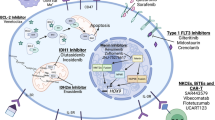Heading
Abstract
Purpose. In order to determine whether Ewing tumour patients may be potential candidates for imatinib mesylate therapy, we analysed the expression of the currently known imatinib mesylate-sensitive tyrosine kinases and tested sensitivity to imatinib mesylate in a panel of eight Ewing tumour cell lines in vitro.
Methods. Expression of the different tyrosine kinases was assessed by flow cytometry and RT-PCR. Sensitivity to imatinib mesylate was analysed using a standard MTT proliferation assay.
Results. Flow cytometric and RT-PCR analyses in a panel of eight Ewing tumour cell lines demonstrated expression of several imatinib mesylate-sensitive tyrosine kinases, including c-KIT, platelet-derived growth factor receptor, c-ABL and c-ARG. However, in the MTT proliferation assay, all eight Ewing tumour cell lines were found to be resistant to imatinib mesylate at concentrations ranging from 0.1 to 10 µM.
Conclusions. Despite the expression of imatinib mesylate-sensitive tyrosine kinases, Ewing tumour cells proved resistant to imatinib mesylate in vitro. This observation has implications for the selection of patients for experimental therapy with imatinib mesylate.
Similar content being viewed by others
Author information
Authors and Affiliations
Additional information
Electronic Publication
Rights and permissions
About this article
Cite this article
Hotfilder, M., Lanvers, C., Jürgens, H. et al. c-KIT-expressing Ewing tumour cells are insensitive to imatinib mesylate (STI571). Cancer Chemother Pharmacol 50, 167–169 (2002). https://doi.org/10.1007/s00280-002-0477-8
Received:
Accepted:
Issue Date:
DOI: https://doi.org/10.1007/s00280-002-0477-8




